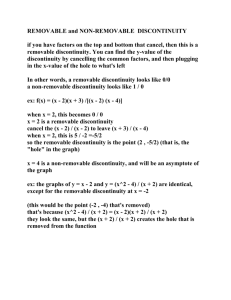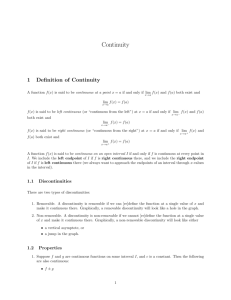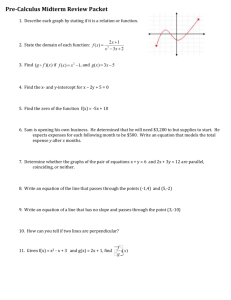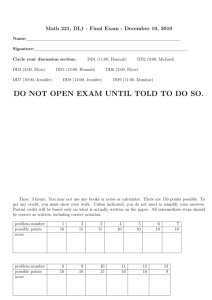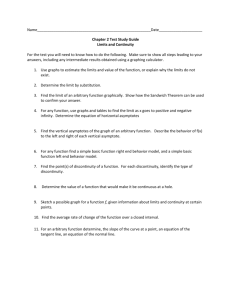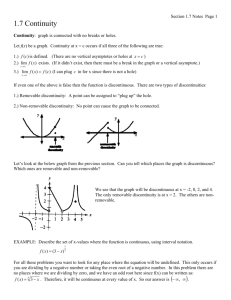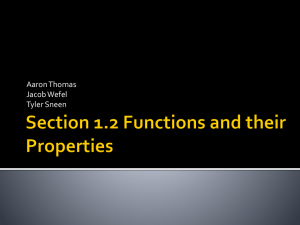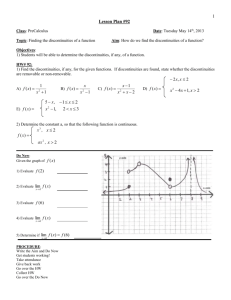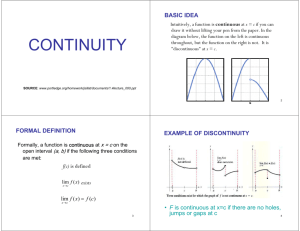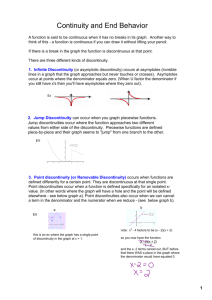Workshop #9
advertisement
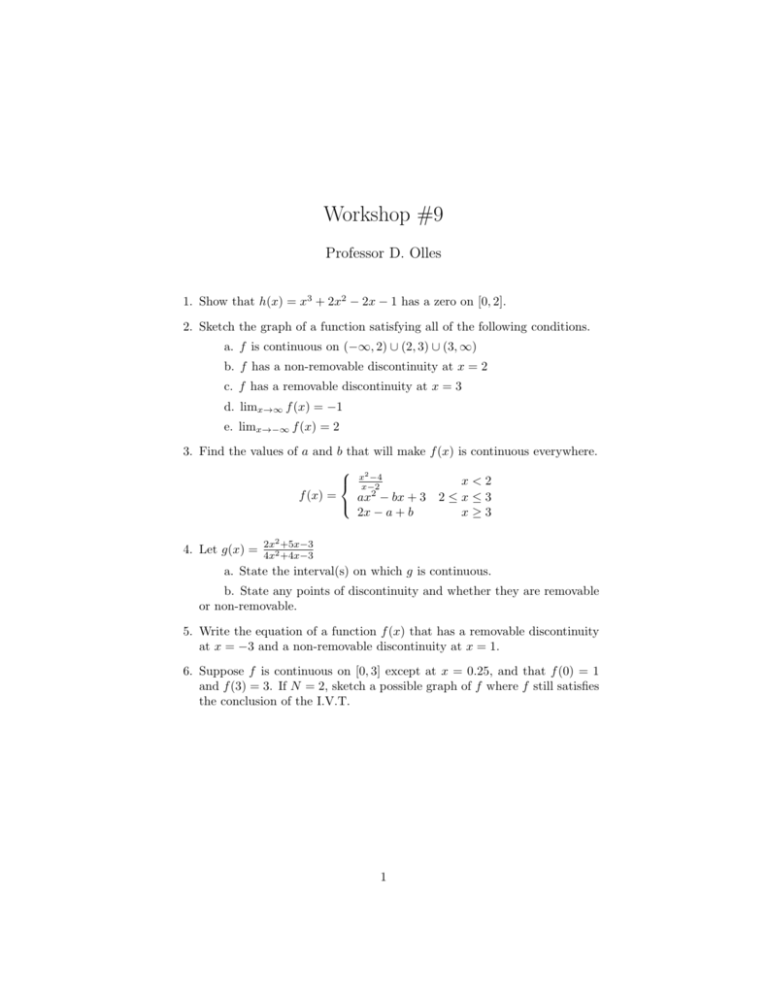
Workshop #9 Professor D. Olles 1. Show that h(x) = x3 + 2x2 − 2x − 1 has a zero on [0, 2]. 2. Sketch the graph of a function satisfying all of the following conditions. a. f is continuous on (−∞, 2) ∪ (2, 3) ∪ (3, ∞) b. f has a non-removable discontinuity at x = 2 c. f has a removable discontinuity at x = 3 d. limx→∞ f (x) = −1 e. limx→−∞ f (x) = 2 3. Find the values of a and b that will make f (x) is continuous everywhere. 2 −4 x<2 xx−2 f (x) = ax2 − bx + 3 2 ≤ x ≤ 3 2x − a + b x≥3 2x2 +5x−3 4. Let g(x) = 4x 2 +4x−3 a. State the interval(s) on which g is continuous. b. State any points of discontinuity and whether they are removable or non-removable. 5. Write the equation of a function f (x) that has a removable discontinuity at x = −3 and a non-removable discontinuity at x = 1. 6. Suppose f is continuous on [0, 3] except at x = 0.25, and that f (0) = 1 and f (3) = 3. If N = 2, sketch a possible graph of f where f still satisfies the conclusion of the I.V.T. 1 Solutions 1. Show that h(x) = x3 + 2x2 − 2x − 1 has a zero on [0, 2]. h(0) = −1 h(2) = 8 + 8 − 4 − 1 = 11 h(0) < 0 < h(2) =⇒ there exists a c ∈ (0, 2) such that f (c) = 0 2. Sketch the graph of a function satisfying all of the following conditions. a. f is continuous on (−∞, 2) ∪ (2, 3) ∪ (3, ∞) b. f has a non-removable discontinuity at x = 2 c. f has a removable discontinuity at x = 3 d. limx→∞ f (x) = −1 e. limx→−∞ f (x) = 2 3. Find the values of a and b that will make f (x) is continuous everywhere. 2 −4 x<2 xx−2 f (x) = ax2 − bx + 3 2 ≤ x ≤ 3 2x − a + b x≥3 lim x→2− x2 − 4 = lim (ax2 − bx + 3) x−2 x→2+ lim (x + 2) = 4a − 2b + 3 x→2− 4 = 4a − 2b + 3 1 = 4a − 2b 2 lim (ax − bx + 3) = lim (2x − a + b) x→3− x→3+ 9a − 3b + 3 = 6 − a + b 10a − 4b = 3 1 = 4a − 2b 2b = 4a − 1 → 10a − 4b = 3 10a − 2(4a − 1) = 3 10a − 8a + 2 = 3 2a = 1 ← a = 12 2b = 4 21 − 1 2b = 2 − 1 2b = 1 b = 21 2 2 +5x−3 4. Let g(x) = 2x 4x2 +4x−3 a. State the interval(s) on which g is continuous. 2x2 + 5x − 3 (2x − 1)(x + 3) = 2 4x + 4x − 3 (2x − 1)(2x + 3) 3 1 x 6= − , 2 2 [ 3 1 [ 1 3 − , ,∞ −∞, − 2 2 2 2 g(x) = b. State any points of discontinuity and whether they are removable or non-removable. 3 is a nonremovable discontinuity so, there is a vertical asymptote on the graph 2 1 1 7 x = is a removable discontinuity so, there is a hole on the graph at , 2 2 8 x=− 5. Write the equation of a function f (x) that has a removable discontinuity at x = −3 and a non-removable discontinuity at x = 1. f (x) = x+3 x2 + 2x − 3 6. Suppose f is continuous on [0, 3] except at x = 0.25, and that f (0) = 1 and f (3) = 3. If N = 2, sketch a possible graph of f where f still satisfies the conclusion of the I.V.T. 3
